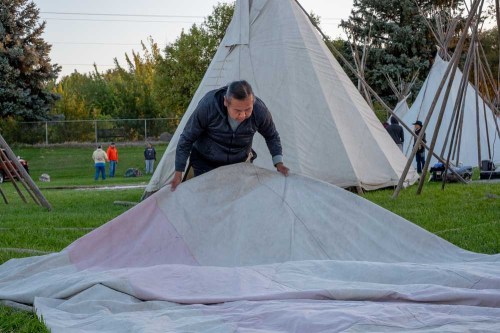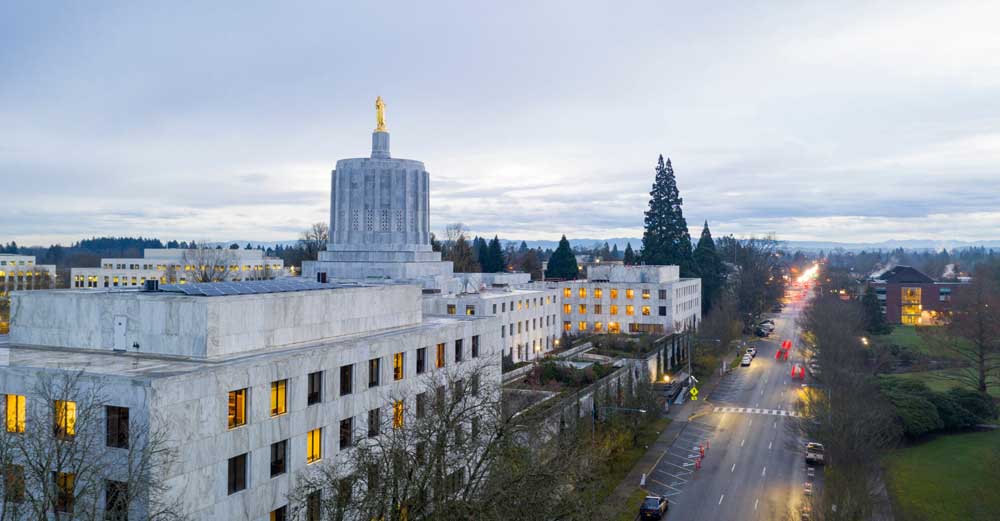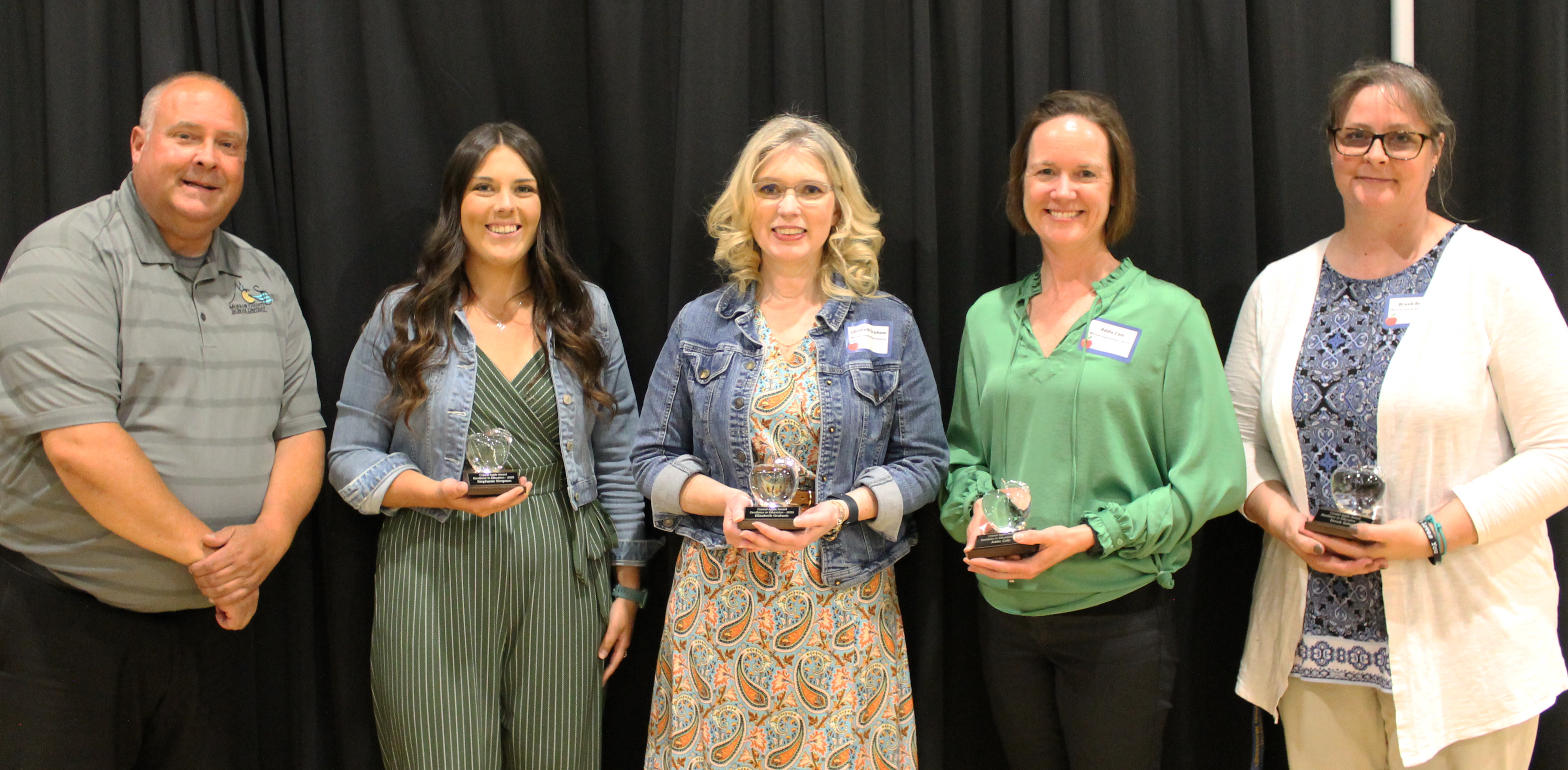Pendleton Round-Up
Published 5:00 am Tuesday, September 10, 2024
PENDLETON — Yellow, blue, white, red — the beads covering the top of Latonia Andy’s buckskin dress shined bright in the evening light. Her grandmother, Cheryl Scott, spent months cleaning the garment and replacing the neckline. By looks, no one would suspect the dress, originally belonging to Andy’s great-grandmother, is about 100 years old.
“My great-grandmother won the beauty pageant in 1940 and wore this dress, so it’s an honor to also have won the beauty pageant in the exact same dress,” said Andy, who won the pageant 70 years after her great-grandmother.
Andy grew up in White Swan, Washington, on the Yakama reservation, where she continues to live today.
“They say Toppenish is the heart and White Swan is the backbone of the reservation, and I think that’s very true,” Andy said.
Though Andy is an enrolled Yakama member, she also is of Umatilla, Cayuse Umatilla, Klamath, Muckleshoot, Nimiipuu, Potawatomi, Shawnee, Irish and Scottish descent.
Andy’s family has participated in Round-Up week since its founding in 1910, and Andy has participated in Round-Up since she was in a baby board. Like the other girls in her family, Andy entered in both the junior beauty pageant and the adult pageant, winning the centennial in 2010 when she was 21. As a child, Andy also had a role in Happy Canyon, which she’s now passed down to her younger cousins.
This year, Andy and her grandmother stayed awake all Saturday night in a truck at the parking lot near Indian Village, waiting for the gates to open at 6 a.m. As soon as possible, they claimed their spot and set up six teepees for their 30 family members.
“We’ve been coming to Round-Up since it started, and so we remember our grandmas and our great-grandmas being here in this exact spot,” Andy said. “We just want to be in the same spot and have our family reunion and be closer to them cause they’re gone now.”
Issues can arise when families grow larger and require more space or return after missing a few years and want to reclaim their spot. Thankfully, this year’s setup was smoother than previous ones, according to Scott.
“They pushed my teepee out last year, and the year before that the big teepee by ours got pushed out. It wasn’t our fault, but they picked on us,” Scott said. “I wanted to go bop their son that was yelling at us. He was saying all kinds of rude stuff.”
Scott remembered sleeping “like a piece of pie” in the teepees as a little girl with her family, their feet in the center and their heads around the perimeter.
“It was a lot of fun growing up with all the aunts making sure you sit up straight, shoulders back, use your manners,” Scott said. “We couldn’t go out of the teepee if our hair was messy. We had to be cleaned up.”
Scott shares her teepee with Andy and her other granddaughter. Next to them is the kitchen teepee, where Scott makes coffee early in the morning. Andy’s mother and siblings stay in the third teepee, and her aunts and cousins sleep in the remaining three.
“It’s a huge family reunion,” Andy said.
The kitchen teepee, the same one used when Scott was a baby, is more than 70 years old. A rip near the top has been patched with lighter canvas that allows sunlight to pass through.
Soon, the teepee will be retired and perhaps repurposed after years of being the center for discussion and the reception area for guests.
“The stories this teepee could tell if it could talk,” Andy said. “The teepee poles are 13 years old and “about to become firewood.”
Three weeks before Round-Up, Andy went looking for new poles, but the wood was wet and sappy. Next summer, she and her family will try again.
To stay warm, Scott wraps plastic around the edge of the teepee and tucks it under the poles to prevent the cold air from coming through. When it rains, Scott places plastic at the top to catch the water.
“If we don’t protect it, it’s gonna get wet, and it’s gonna be miserable,” Scott said.
For Andy, Round-Up is the one time of the year when she helps set up the teepees. One day she’ll have to learn how to do it with only her cousins, but for now her grandmother and aunts guide the process.
During her regular life, Andy tries to balance the traditional and the modern. She enjoys fishing on the scaffolds at Cascade Locks. On a social media post, she holds the heart of a salmon, still beating strong. She’s unnerved by sight, having seen it all her life. Another activity that Andy enjoys is beadworking, which she started learning as an adult. Though she primarily makes earrings, she also just finished an outfit.
On the modern side, Andy recently graduated from Heritage University where she majored in business administration. Although the university is located on the Yakama Reservation, where 11% of its students are Native American, Andy said it could still be difficult to be in a university setting and fulfill her obligations to her family and culture.
“For example, if somebody passes away in your family, we go through a very long ceremony [about a week], and they just see that as you’re missing a bunch of school,” Andy said.
For the younger generation growing up on the reservation today, cultural revitalization has become a major focus. Andy’s niece is interested in dancing and powwows and studies the Ichiskin Sinwit language at school. Out of the 11,000 Yakama members, only around 25 can speak the language conversationally. For many generations, studying the language was not an option and even speaking it in school was forbidden.
Scott remembers approaching her father in the mid-90s to ask him how to speak the language.
“I asked him how to say some words like greetings, and he just sat there, and he was going like this (moves hands nervously). He was thinking of the words, but he got beat on his hands for speaking,” Scott said.
Scott looks positively at the current revitalization efforts.
“I’m happy about now because on the reservation in the schools, they’re teaching them our language, so little kids are learning,” Scott said. “My daughter is trying to set up to have her kids learn from the computer, so I think it’s good.”
Though the U.S. has experienced a cultural reckoning the last few years, modern Native American issues are still often overlooked. The Missing and Murdered Indigenous Women epidemic is one that Andy said deserves more attention. While the issue has been known by those in the community for a long time, it is just now being recognized by the mainstream. For those interested in learning more about Native American history and culture, Andy recommends the non-profit IllumiNative.
Like her granddaughter, Scott grew up on the Yakama Reservation where the bitter roots grow and wild horses roam. As a young girl, Scott favored a buckskin horse, though she rode her brother’s appaloosa “Sticktail” in the Round-Up parades.
According to Scott, the Native American women’s saddle had a horn designed to carry bags, and a baby board could even be attached to the side. If the rider was traveling far, it was possible to lean forward and take a nap.
Scott’s family has a long history of competing in rodeo. Her husband was a wild horse racer and won the St. Paul rodeo. Her grandfather used to ride in the back of the Round-Up.
As a young adult, Scott relocated from the reservation to Tacoma, where her first husband was attending school. Living off the reservation for the first time broadened her perspective and influenced her to eventually move to Portland.
“I knew there was a bigger world, but some of them don’t,” Scott said. “That’s their world, just that little little town, the part of the reservation where we lived and grew up.”
At the time, Scott said opportunities on the reservation were limited due to lack of jobs and resources.
“There’s no bigger businesses. It’s all farm, either you’re a laborer or if you got the chance to go to college, you could get a job,” Scott said. However, she adds, “With the tribe, the jobs just kind of stay in certain families. So it’s hard there, it’s kind of desolate. It’s like its own little world.”
Despite moving off the reservation, Scott maintained a strong connection with her family and community. She would take her mother to Wallowa and Kamiah for powwows, and today she brings her grandchildren to the convention center for dancing. If there’s anything she still misses about the reservation, it’s seeing her brothers.
As a member of the Bow and Arrow Club in Portland, Scott helps with Friday culture nights for dancing and drumming, group meals, the Delta Park Powwow, and even the Rose Parade, which the club had a float for.
“They were supposed to give me a seatbelt for the little chair I sat on. They didn’t give me one, so I had to hold my feet a certain way, and our golf cart wouldn’t start so we had to get dragged, but it was kind of fun,” Scott said.
Having also volunteered with an art show and the Native American veterans in Portland,
Scott seems to know just about everybody. When asked what percent of people in the Indian Village she knows, she replied, “Quite a bit of them.”
With a lively and open atmosphere, Round-Up serves as an ideal ground for relationships to blossom. Of course, relatives are to be kept at arm’s length, which can sometimes be a challenge in such small social circles.
“My dad said, ‘If you meet some guy, and you’re looking at him, you make sure you find out his last name, and then you tell me,'” Scott remembered.
The few years of Round-Up that Scott did miss were when she was married to her first husband.
“He thought all the guys there were my old boyfriends.”
Though Scott was never interested in dating at Round-Up, she knows others who no longer attend because of former romances.
“He doesn’t like going there. It’s kind of a touchy subject for them,” she recounted of one couple.
When one of Scott’s daughters married a non-Native man, security wouldn’t allow him to enter the Native American section of the arena.
“So I walked him in, and I go ‘this is my son and my daughter,’ and then walked through,” Scott said. “I figured if he was going to argue, I’d stand there and argue with him.”
This year, Scott went into the arena twice, rested on the hotter days, and watched her grandchildren participate in Happy Canyon and the beauty pageants. She helps them by braiding their hair and taking photos.
Through the years, people have come and gone, stagecoach racing has been removed, Indian relay racing has been added, the Happy Canyon script has become more culturally sensitive, the morning drums in Indian Village have disappeared, and the restrooms have been greatly improved.
One piece that still hasn’t changed in the last century is Andy’s regalia.
“My hope for myself and the future of my family is that we all have new dresses made and new horse regalia made because I think that would be beautiful for us to have a whole other generation of dresses that can live on past us,” Andy said. “And we’re also taller than our grandmas,” she laughed.
This is part two of a six-part feature from Olivia Wolf, writer and editor of thetinyvagabond.com.
She wrote the story about the 2023 Pendleton Round-Up and Happy Canyon Night Show. The work focuses on the perspectives of seven people:
• A grandmother and granddaughter from the Yakama tribe who stay in the Indian Village and whose family has been attending the Pendleton Round-Up since its founding in 1910.
• A husband and wife of the Confederated Tribes of the Umatilla Indian Reservation who also stay in village and live on the reservation near Pendleton.
• Pake Sorrey, Pendleton local who won the 2023 Round-Up steer roping competition and whose father won twice before him.
• And Toni Minthorn, a horsewoman and 2023 Hall of Fame inductee who trains the Round-Up queen and princesses to do the grand entry.
The East Oregonian is publishing a new part each day of the week during the Pendleton Round-Up.






